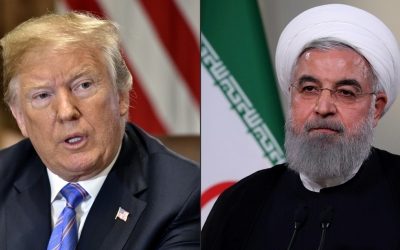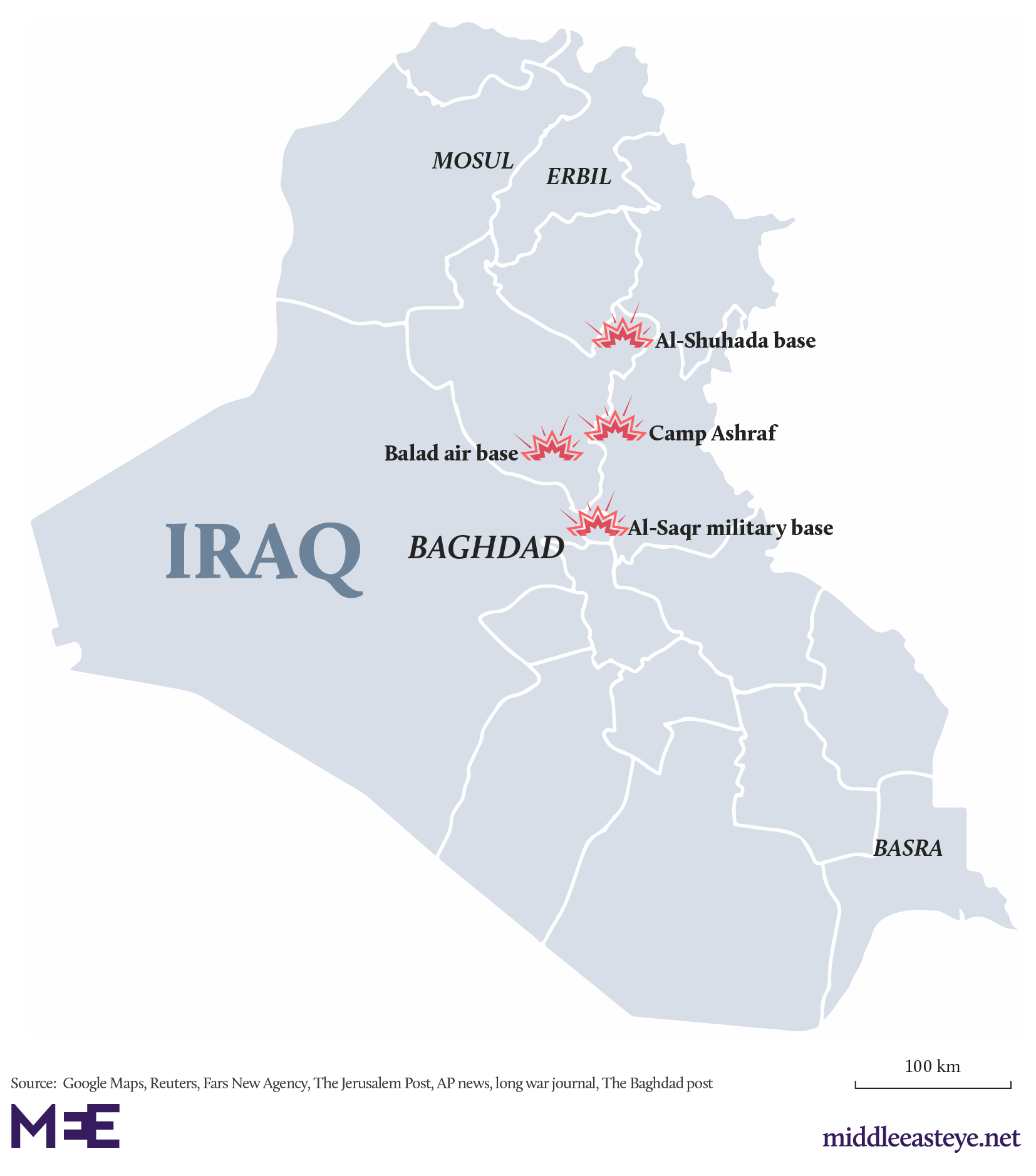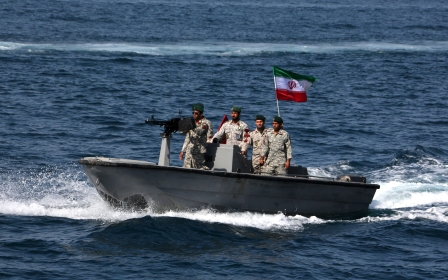Is Israel striking Iranian-backed paramilitaries in Iraq?

Clashes between regional archfoes Iran and Israel have, for the past few years, centred mostly around Syria.
There the Iranian Islamic Revolutionary Guard Corps (IRGC) and its Quds Force have established a formidable military presence, both to prop up the Assad government and place its forces closer to Israel.
Now, it appears Syria may not be the only theatre in which the two are coming to blows, as mysterious attacks are being launched deep into the Iraqi heartland.
On Tuesday, a series of blasts hit a position belonging to the Iran-backed Shia-majority paramilitary al-Hashd al-Shabi (PMF) near the Balad air base, which also hosts US troops and contractors. The base is located about 80km north of capital Baghdad in the Salahuddin governorate.
Purportedly carried out by a drone, the explosions “martyred several people”, according to the semi-official Fars New Agency, which is close to Iran’s Revolutionary Guard.
The Balad blast was the fourth of its type that targeted PMF bases or munitions depots across Iraq over the past month.
About a week earlier on 12 August, explosions at the PMF-linked al-Saqr military base in Baghdad left at least one dead and 29 others wounded.
Another blast took place at Camp Ashraf near Diyala governorate, northeast of Baghdad, on 28 July, less than two weeks after another struck the al-Shuhada base near Amerli in Salahuddin on 19 July, killing two Iranians affiliated with the Revolutionary Guard.
Expanding areas of operations
In Israel, Iran and Iraq suggestions have been made that Israeli forces may be responsible. Unsurprising, when Israel’s leaders have talked up the possibility.
“Iran has no immunity, anywhere ... we will act and currently are acting against them, wherever it is necessary,” said Israeli Prime Minister Benjamin Netanyahu on Monday.
On Thursday, Netanyahu was even more direct in suggesting that Israel may have been involved in the attacks.
"We are operating, not just if needed, we are operating in many areas against a state that wants to annihilate us," he told Israeli television Channel 9 when asked if Israel would hit Iranian targets in Iraq.
"Of course, I gave the security forces a free hand and instructed them to do anything necessary to thwart Iran's plans."
As the Islamic Republic is trying to move parts of its regional defence-offence infrastructure closer to home in the wake of growing Israeli attacks on its positions in Syria and in anticipation of a looming military conflict with the United States, Israel may now be seeking to deny the IRGC the capacity to target it from Iraqi territory.
“Iran has deployed missile launching platforms and missile factories in Iraq as part of preparations for a possible military confrontation with the US and Israel,” Yossi Mansharof, research fellow at Haifa University’s Ezri Center for Iran and Persian Gulf Studies, told Middle East Eye.
“Some of the camps that have been attacked were the sites from which the IRGC was reportedly coordinating its operations in Syria, Iraq, Yemen and Lebanon.”
Most commentators in Iran and Iraq have pointed the finger of suspicion towards Israel, which they believe has received intelligence and operational assistance from US forces in Iraq and relied either on F-35 fighter jets, with long-range strike capabilities and sophisticated stealth features, or on military drones to carry out the attacks.
A third possibility is sabotage operations on the ground, which seem less likely amid the frequency and magnitude of the blasts.
When asked if its forces were behind the raids in Iraq or not, a spokesperson for the Israeli military told Middle East Eye that it declined to comment.
MEE has asked the US and Iraqi militaries for comment, with no reply at the time of publication.
Fiery response
Following the Balad air base explosion, the PMF issued a fiery statement claiming that the US had allowed four Israeli drones to enter Iraq along with American forces to conduct the attacks.
“We announce that the first and last entity responsible for what happened are the American forces, and we will hold them responsible for whatever happens from today onwards,” according to the statement, signed by Jamal Jaafar Ibrahimi, deputy head of the PMF, known more publicly as Mahdi al-Mohandes.
In late June, top national security advisers from Russia, the US and Israel held a two-day trilateral meeting in Jerusalem to discuss regional security developments, including Iran’s military presence in Syria and Iraq.
'It seems that such attacks further boost the process of rapprochement between Israel and Saudi Arabia'
- Yossi Mansharof, analyst
Although Russian security adviser Nikolai Patrushev appeared to side with Tehran - Moscow’s key partner in the Syrian civil war - against US attempts to pressure Iran, there are indications that all sides could at least agree on the need to deal with “destabilising” Iranian behaviour in the wider region, suggesting that Israeli operations in Iraq with American assistance might have Russia’s tacit blessing as well.
More clearly, however, Israel’s confrontational strategy with Iran would be welcome among Iran’s Arab nemeses, such as Saudi Arabia and the United Arab Emirates.
Mansharof doubts that international support would be a main consideration, if Israel were behind the raids.
However, he said: “It seems that such attacks further boost the process of rapprochement between Israel and Saudi Arabia.”
Iraqi territory had recently been used by Iran to launch drone strikes against oil facilities and pipelines in Saudi Arabia, Mansharof noted.
Other suspects
In response to the deadly incidents, and more specifically after the third explosion in the al-Saqr base, Prime Minister Adel Abdul Mahdi’s government started to enforce stricter regulations for “all Iraqi and non-Iraqi parties” using the country’s airspace.
That included the US air force, which still conducts combat missions against the Islamic State (IS) militant group from Iraqi territory.
According to the new rules, "armed reconnaissance, fighter planes, helicopters and drones of all kinds” now need the "exclusive approval of the general commander of Iraqi armed forces or his authorised representative", otherwise any aircraft "will be deemed to be hostile aviation and handled immediately by our air defences".
And then came the fourth explosion near the Balad air base.
While Tehran has so far kept silent on the incidents - if Iran confirms Israeli culpability for Iranian fatalities, it may feel compelled to take action to save face - the Revolutionary Guard may now resort to responding indirectly.
Or it may provide Iraqi PMF units with air defence capabilities to fend off Israeli strikes, in the same style as it has reportedly equipped Yemen’s Houthi movement with surface-to-air missiles against American reconnaissance and attack drones.
“There are other suspects than Israel, such as PMF opponents within the Iraqi army or Americans themselves,” a Tehran-based IRGC-affiliated intelligence analyst told MEE.
However, they added, “if the strikes continue and Iranian casualties spike, Tehran might give a limited response either through its proxies or by targeting Israeli positions in the Golan Heights.”
“Iran has a higher tolerance threshold for Israel compared to the United States,” the analyst said.
“Because unlike the US, there is no end conceivable for its enmity with the Zionist regime, so the Islamic Republic prefers to deal with Israel once and for all at the right time rather than by fits and starts here and there.”
Middle East Eye delivers independent and unrivalled coverage and analysis of the Middle East, North Africa and beyond. To learn more about republishing this content and the associated fees, please fill out this form. More about MEE can be found here.







